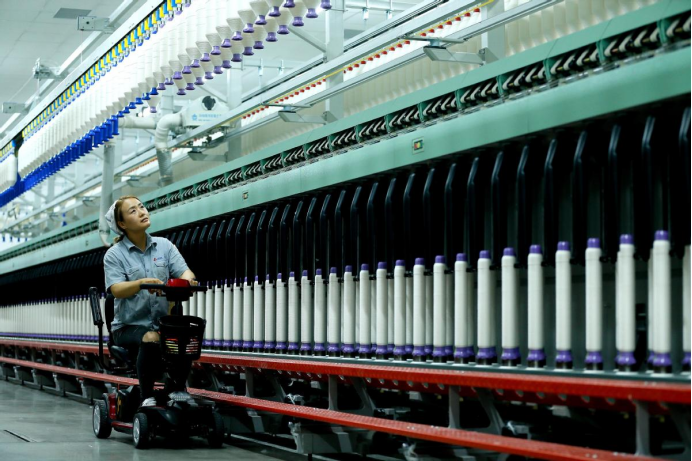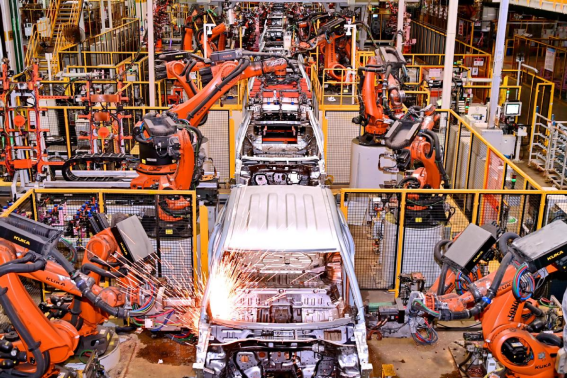China stresses their upgrade via sound measures in smarter, greener directions

A worker inspects an intelligent yarn production line in Qingdao, Shandong province, on July 15. [LIANG XIAOPENG/FOR CHINA DAILY]
China, the world's manufacturing powerhouse, is facing a big challenge as it scrambles to cultivate cutting-edge technologies and emerging fields, and deal with its sprawling traditional industries such as steel, nonferrous metals and building materials.
Though some have called these "low-end" and urged for the phasing out of such industries, arguing that they are not productive enough and could trigger negative environmental fallout, China's top industry regulator has expressed a more rational view.Jin Zhuanglong, minister of industry and information technology, has said that China's traditional industries are vast and account for over 80 percent of the manufacturing sector, including steel, nonferrous metals, petrochemicals, building materials, light industry, machinery, textiles and apparel, foods, and traditional Chinese medicine.These traditional sectors form the foundation of the modern industrial system, are crucial to economic development and people's livelihoods, and are essential for maintaining China's status as the world's leading manufacturer, Jin said."Regardless of the present or the future, traditional industries should not be simply labeled as 'low-end industries' and phased out. We must prioritize the transformation and upgrading of traditional industries, employing a set of 'comprehensive measures' to accelerate their development toward higher-end, smarter and greener directions, allowing traditional industries to 'blossom anew'," Jin added.Looking ahead, Jin's ministry will focus on implementing high-end, intelligent, green and integrated technological renovations of traditional industries, supporting new technology pilot projects, and executing major manufacturing technological upgrades and large-scale equipment renewal projects. The aim is to rejuvenate traditional industries, making them carriers of new quality productive forces.

A view of a smart manufacturing line for vehicles in Nanchang, Jiangxi province, in April. [ZHU HAIPENG/FOR CHINA DAILY]
Apart from prioritizing digital transformation in manufacturing enterprises, the Ministry of Industry and Information Technology will also intensify energy-saving and carbon reduction initiatives, particularly in key industries such as steel, nonferrous metals, petrochemicals, and building materials, as well as in critical areas like data centers and communication base stations, said Zhao Zhiguo, chief engineer of the MIIT.
These efforts will include constructing digital energy and carbon management centers and accelerating the development of resource recycling systems to enhance resource security, Zhao said.That is of particular importance in an era of rapid development of artificial intelligence.Computing power is a crucial element supporting technological progress and industrial transformation. However, data centers are often high-temperature environments, and the computer servers need a sophisticated cooling system.As a result, efficient, green data centers are essential for ensuring computing power supply and driving AI innovation, experts said.To help solve the problems, Sugon Data Energy (Beijing) Co Ltd, an affiliate of Chinese supercomputer manufacturer Dawning Information Industry Co, is dedicated to applying liquid cooling technology to broader intelligent computing scenarios.Zhang Peng, vice-president and chief technology officer of Sugon Data Energy, said that the company's proprietary liquid cooling technology involves immersing computing equipment like servers in a low-boiling, nonconductive, and highly efficient cooling liquid.This method significantly improves energy efficiency and reduces energy consumption compared to traditional air cooling, effectively addressing data center heat dissipation challenges and providing innovative pathways for building low-carbon, efficient intelligent computing data centers, Zhang said.Sugon Data Energy's proprietary cooling liquid, an electronic fluorinated liquid, offers high insulation, low boiling point, high stability, low viscosity and absolute safety with environmental friendliness (no ozone depletion and low greenhouse effect).The product, independently developed by Sugon Data Energy, has outperformed similar foreign products in performance and costs, breaking foreign monopolies and achieving domestic substitution, Zhang added.Going forward, Sugon Data Energy said it will continue to invest in research and development of immersion liquid cooling technology and other green data center solutions. This will drive technological innovation and industrial upgrading in collaboration with global partners to create a grand blueprint for green intelligent computing.Such cases are just a part of the vast digital and green transformation of China's manufacturing industry. Significant progress has been made in the digital transformation of the manufacturing sector, creating favorable conditions for high-end, intelligent and green development.Xin Guobin, vice-minister of industry and information technology, said currently, China's industrial robot installations account for over 50 percent of the global total, and the industrial internet has achieved comprehensive coverage of major industrial categories, nurturing 421 national-level smart manufacturing demonstration factories.MIIT, in collaboration with local governments and departments, will work on implementing a manufacturing digital transformation initiative, which aims to build about 200 high-standard industrial parks that feature efficient digital transformation by 2027, and complete a round of digital transformation for major industrial enterprises by 2030, Xin added.



